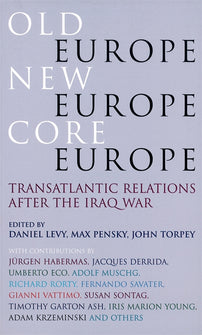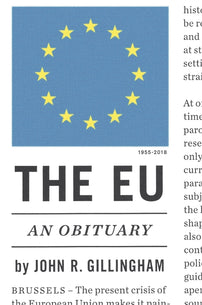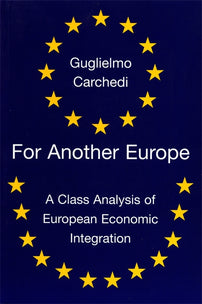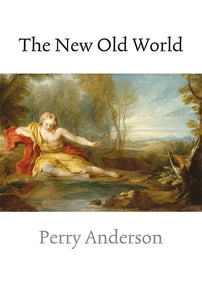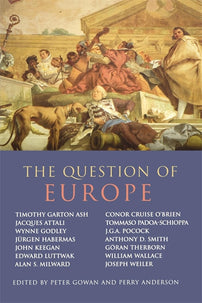More Than One Idea
A 2016 book reveals pro-European intellectuals of the 1930s who greeted Nazi invasion as a historic opportunity for their project.

First published in Le Monde diplomatique. Translated by David Broder.
Sometimes, it is the most powerful explosives that most easily slip through the security checks. And it well may be that among all the books devoted to criticising European Union — and there is no lack of them breaking through —the most devastating is one of those that takes the most reserved approach. And also one of the most unique. A meticulous historian’s study, published with the oh-so revolutionary Éditions du CNRS, Bruno Bruneteau’s Les ‘Collabos’ de l’Europe nouvelle has a lot of capacity to cause damage. But, if you will excuse the oxymoron, it inflicts this damage rather subtly.
It may seem totally perverse to attach the European idea to the word "collabos" [World War II-era Nazi-collaborators]; and yet this link can also be proven historically. And that must give pause for thought. It should make us question not so much the European idea itself, as the types of blindness to which certain ways of pursuing this idea can lead. Although the sacred history of Europe generally passes over this episode in silence, it just so happens that a number of pro-European intellectuals of the 1930s, won to this cause in the wake of Aristide Briand’s project of a European federation, despite everything considered the Nazi invasion a sort of historic opportunity. Though doubtless unpleasant in certain regards, it was an opportunity to make tabula rasa of the landscape of nation states, as a first step toward the reconstruction of Europe as a new, united political system. For this very reason, not only did these intellectuals greet the continental conflagration and the German occupation with manifest interest, or even burning enthusiasm, but some of them even joined the "movement" and actively engaged in collaboration. For that was where the historical process that was delivering the much-desired "new Europe" was already playing out.
But we cannot make Bruneteau’s book say what it does not want to say. To do so would be to disrespect his work as a historian — and this volume counts almost five hundred, extraordinarily thoroughly documented pages. Indeed, he holds back from falling into the crudest interpretative extrapolations. If at first not all pro-European intellectuals gave in to "the event," a lot of them were in no sense actual or even potential fascists. The group they together represented was, in fact, very internally diverse, and Bruneteau provides us with a very precise map of their affiliations. Nor did that period provide some sort of invariant essence of pro-European thought, such that today’s pro-Europeanism could simply be read on the basis of yesteryear’s, or even as if bore the indelible mark of that first rendez-vous with history. Yet Bruneteau’s work is perfectly arranged to allow an impressive series of echoes to spread at a lower volume, without he himself venturing to make them speak out loud. This book instead leaves it up to the reader to work things out for herself.
So the story begins at the end of the 1920s. Not because there had not been utopias for Europe before that, but because the period between Richard Coudenhove-Kalergi’s Pan-Europa in 1923 and the Memorandum on the Organization of a System of Federal European Union which Aristide Briand presented to the League of Nations in 1929 was the moment that something like a designated pro-European political current took form, carried forth by a generation of intellectuals socialised in the European idea. It is not too hard to work out the reasons for that, in the wake of World War I… However, it was in fact the unhappy fate of Briand’s Memorandum that would give it a decisive push forward. If the League of Nations was unable to do justice to the European idea, the internationalist route having proven deficient, peace on the continent itself demanded a shift onto the supranational path.
In a supreme paradox — making even Hegel’s ruse of reason seem ridiculous — it was the Nazi war that appeared to these people as the great opportunity for the (future!) European peace… In reality, these diagnosticians of crises, who had no lack of reasons to get agitated in the 1930s, saw each convulsion from their own point of view. But for all of them, this looked like a moment in which much would be resolved. For some, the quest for peace demanded an end to nationalisms, and thus to nations, even if that demanded a prior moment of destruction. For others, the potential new Europe would finally assert a continental identity heterogeneous to that of the Anglo-American world. For their part, the partisans of Marshal Pétain’s "national revolution" saw this as the period of the great reconciliation among classes, taking a different route from the symmetrically dire paths of either capitalism or Bolshevism.
But it was above all the vision of the "economic realists" that provided the European idea with its characteristic substance. This is also a troubling consistency, because of both the power of the echoes of the 1930s and 1940s in our own time, and the peace of mind with which some could see the German occupation as an opportunity well worth contemplating. For it is in this regard that Bruneteau’s work displays its great, explosive power: in the sense that faced with the catastrophe of its time, this current of thinking referred to so many things that also exist in our own. Indeed, all the contents of the nascent European neoliberalism were here making their appearance, mixing in even among the very worst forces without batting an eyelid.
And that starts with the bridging of the Left-Right divide, considered a useless and parasitical "politicking" that takes us away from rational managerialism. Without doubt, here we are dealing with an ideological constellation that the historians of ideas have explored for quite some time, from the polytechniciens of the X-Crise group to the cadres of the École d’Uriage [a Vichyite college], to economists like François Perroux and Francis Delaisi. All of these were militants who insisted on the urgent need to "take consciousness" of the fact that what "reality" now meant was economics rather than politics. Economics would, then, provide the single principle in whose terms we must envisage the conduct of the great masses of humanity; and this principle is all the more exclusive because it imposes its own necessity — the needs of "reality," indeed. A conduct that it is high time we hand over to the technicians of neutral rationalism.
They thought that the "German Europe" that was then on the horizon had two benefits. Firstly, it overthrew the old nation-states, the outmoded yet entrenched sites of the pre-rational politics. Next, because as this new Europe tore down the absurd old borders it brought about an integrated continental space where the division of labour could be reorganised on an expanded scale, thus allowing new possibilities for optimising capital allocation.
Today’s reader cannot fail to recognise the same argument that was used for the European Single Market in 1986, and its supposedly necessary corollary, the single currency — and they were thinking about that, too, even in the middle of the 1940s! And nor can we fail to see the origins of the technocratic depoliticisation that aims at the post-sovereign administration of things.
Still less can we fail to note that such ideas could accommodate themselves to Hitler’s war and even see this context as a promising opportunity. It was here that the Europeanism of these years showed its main defect: that it had only a single idea. "Building Europe" was that single idea, and since there was no second one such as could provide a critical evaluation of the means to be used to that end… any means were fine. Had history left Nazi Germany the historic task of carrying out the tabula rasa necessary to the emergence of the new Europe? So be it.
When we read Bruneteau’s book, what is really striking is this portrayal of such gigantic political disorientation. Amidst an extreme political situation, there was a massive loss of power of discernment. In fact, this loss was determined by the blind pursuit of the single idea, which had now become ignorant of any outside consideration. And those who lost their path came from all sides, including the Left. They were syndicalists and trade unionists, socialists, pacifists and internationalists gone overboard, for whom undoing states’ sovereignty was the objective that came before any other.
Mutatis mutandis (of course), we can only think of those radical-left theorists sixty years later, who had no hesitation in seeing globalised capitalism as a useful ally in this same agenda of getting rid of the nation state, and thus "logically" enough called for a "Yes" vote in the 2005 referendum on the European Constitution.
Bruneteau steers well clear of drawing explicit political morals from the facts that he so diligently assembles. But there is one, very general moral: namely, that we have to have more than just one idea. Especially when history comes along to put us to the test. And this is a moral highly relevant to our own time. It equally concerns both the partisans and the opponents of today’s Europe. Fetishising the single idea of euro exit can spawn the worst of consequences. For however much this exit is needed, we cannot negotiate it in just any manner, with just anyone.
As for the partisans of the single currency, they have been lucky enough not to cross paths with a fascist war. But they were not so fortunate as to avoid crossing paths with neoliberal capitalism. No one would even think of putting these two things on the same level. But the formal identity between the two situations is self-evident. Anything can be sacrificed to the pro-Europeans’ Europe, within the limits of what our present era considers sacrificeable. And in the era of neoliberal capitalism that means sacrifices like inequalities, precarity, bad working conditions, suicides…. Today’s pro-Europeanism, like the previous pro-Europeanism in its own age, has no regard for these small instances of collateral damage. For it has no second idea, and especially not an idea of social justice. And as in its predecessor’s case, this failing could well determine its place in history.
[book-strip index="1" style="display"]
